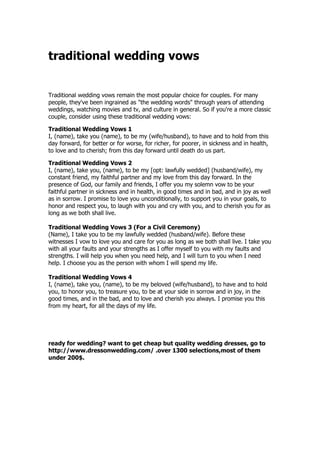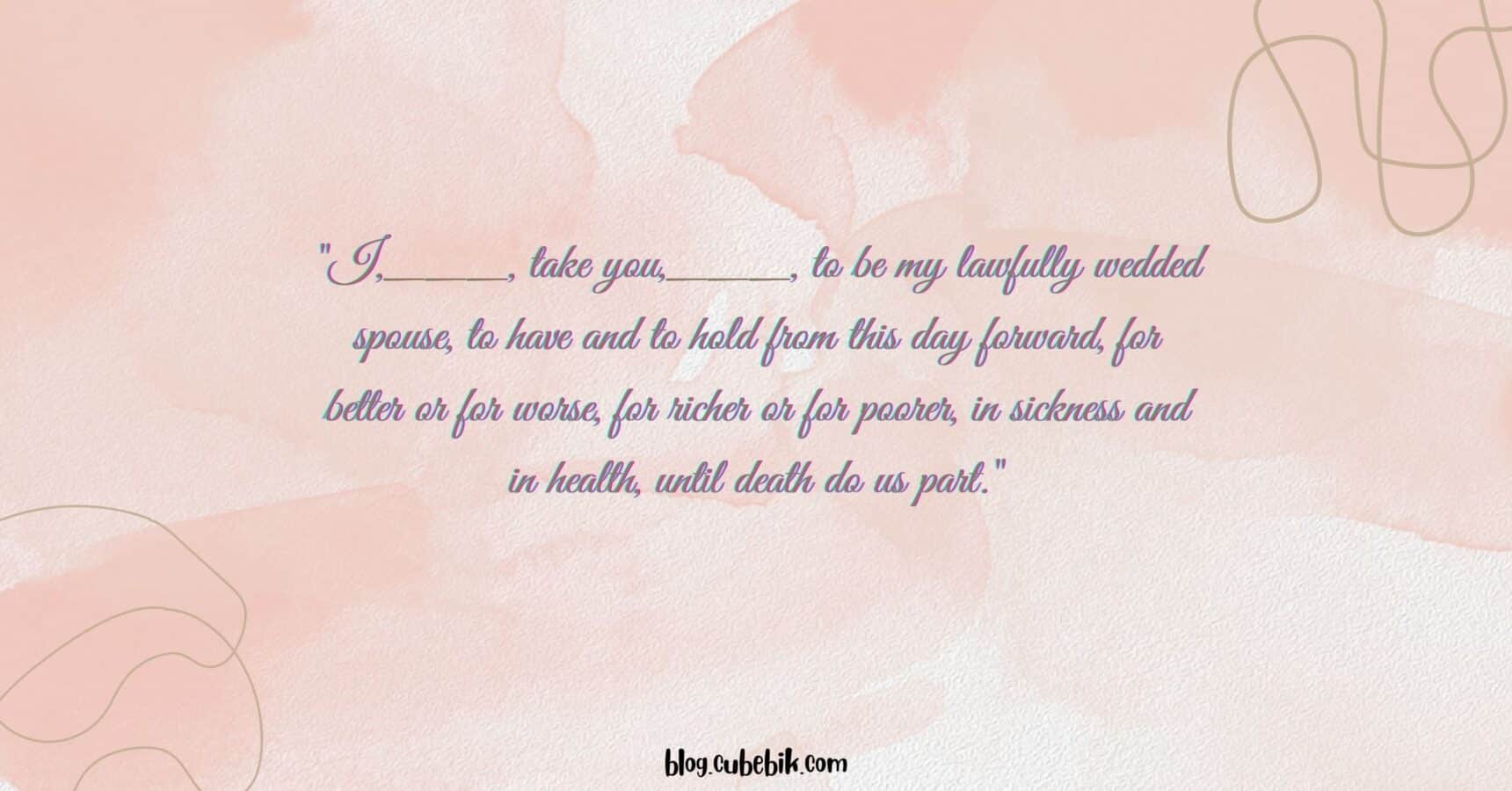The traditional wedding vow dates back centuries and has its origins in the Christian church. In early Christian weddings, the bride and groom would make a pledge to each other in front of witnesses as part of the marriage rite. This pledge was considered a solemn vow before God to love, honor, and cherish each other until death. Over time, the wording of these marriage vows was standardized into what we now recognize as the traditional wedding vow.

The most familiar lines of the traditional wedding vow come from the Anglican Book of Common Prayer, which was first published in 1549. The lines “to have and to hold from this day forward, for better for worse, for richer for poorer, in sickness and in health, to love and to cherish, till death us do part” have their origins in the Church of England marriage service from over 450 years ago.
The Meaning of the Traditional Vows
When couples say their wedding vows, they are not just reciting some meaningless words. The language of the traditional wedding vow has significant meaning behind it.
“To have and to hold” signifies a commitment to fully participate in the marriage and take on all that comes with binding oneself to a spouse. It refers to fully accepting everything about your partner.
“For better or for worse” means sticking together no matter what challenges you face in life. The good times are easy, but this vow commits spouses to stay devoted even when things get difficult.
“For richer or poorer” is a vow to remain committed even if financial circumstances change. No matter what money problems may arise, this vow means couples should support each other through all of it.
“In sickness and in health” commits spouses to care for one another even through devastating illness. Remaining loyal and loving despite the hardship of poor health embodies the essence of marriage.
“To love and to cherish” contains what may be the most important vow—to actively love rather than just passively be married. It elevates marriage above a contractual obligation by demanding spouses nurture affection.
“Till death us do part” concludes the vows by defining marriage as an unbreakable bond that lasts for life. It makes marriage permanent in a way few other commitments ever are.
Why We Still Use the Traditional Vows
Even though they originated 450 years ago, there are good reasons so many modern couples choose to take these traditional wedding vows instead of writing their own. For one thing, these poetic vows perfectly capture complex promises and distill them down to concise, beautiful lines. They eloquently convey values that most people still want marriages to embody today like lifelong commitment, mutual caretaking, and unconditional love.
In many ways, the traditional wedding vows are timeless. They have already stood the test of time and changing social mores. The promises made in these vows still represent what most people today hope to achieve in marriage, even though divorce is common and marriage itself looks different than it once did. There is comfort in upholding something that connects us to past generations who pledged themselves to these same words.
These traditional vows also provide a template for the commitment most couples want to make. Not everyone can eloquently come up with marriage promises off the top of their head that encapsulate everything they hope their marriage will be. Using time-honored, meaningful words can convey things couples themselves may struggle to express in their own words when caught up in the emotions of their wedding day.
Criticisms of the Traditional Vows
Despite the beauty and meaning behind the traditional wedding vows, some modern couples choose to write their own vows instead. The main criticism of the traditional vows is that they reflect outdated assumptions about marriage.
Some see “to obey” as regressive and misogynistic, hearkening back to when wives were considered subordinate to and property of their husbands. However, the “to obey” portion has largely been dropped from modern weddings.
The finality of “till death us do part” also bothers some couples in an age when one out of every two marriages ends in divorce. They may tweak the language to be more realistic about the possibility of divorce or to emphasize that the commitment lasts only as long as both partners are happy and loving.
There are also same-sex couples who feel the traditional wedding vows have heteronormative language that does not represent the reality of their relationships. And couples blending families may dislike how the traditional vows focus on the couple alone rather than embracing wider family.
Making Traditional Vows Your Own
For couples who value the essence of the traditional wedding vows but still want to make some changes, there are lots of ways to make the traditional words feel more customized to their relationship.
You can change pronouns like “man and wife” to more inclusive terms like “spouses” or “partners.” You can add a line about blended families, vowing to embrace each other’s children. Or you can change a phrase here and there to resonate more with your personal values.
Another option is to do a mashup of old and new vows. You can say the main portion of the traditional vows and then each add your own personalized promises. This allows you to uphold the historical words while also making sure your unique relationship is reflected.
Ultimately the traditional wedding vow endures because the words speak to timeless truths about love and commitment that appeal to generation after generation. The promises made in those original lines still represent ideals and hopes most modern couples share too. That’s why even centuries later, these traditional wedding vows don’t feel outdated, but rather profoundly universal.



